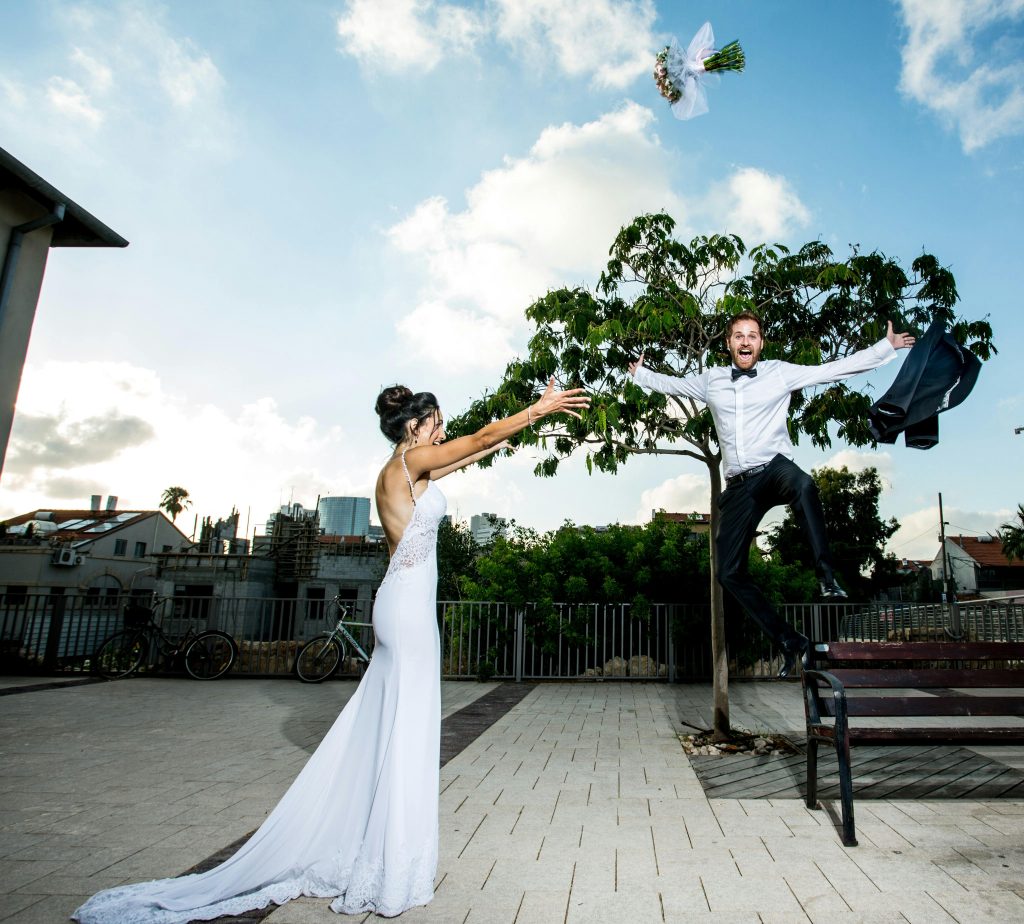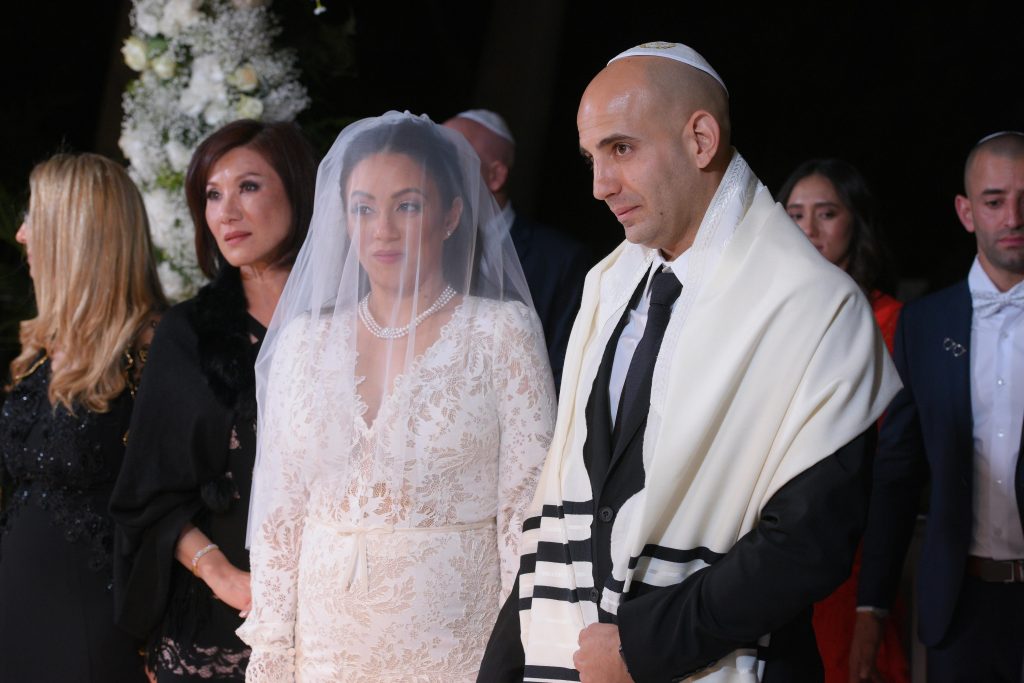You may just assume that Israeli weddings are synonymous with Jewish weddings, but it’s actually quite a diverse culture. Immigrants from North Africa, Eastern and Middle Europe, Arab-Israeli people and Druze all bring their unique differences to the melting pot.
Are you planning on celebrating your Israeli heritage and including some customs in your wedding? Maybe your fiancé is Israeli and you want to learn more about the culture. Regardless of the reason, you’ve come to the right place! In this article we’ll explore some Israeli wedding traditions.

Pre-Wedding Practices
Ashkanazi couples will hold a Shabbat Chatan on the Shabbat one week before the wedding. At this event, the groom reads from the Torah while the congregation showers him with treats. Afterwards, a Kiddush is held as well as prayers and blessings for the couple.
Those of Sepphardic descent practice the popular Middle-Eastern tradition of applying Henna to the hands of the bride. The ceremony typically takes place a few days before the wedding. Everyone dresses in traditional clothing and exchanges small gifts such as wrapped fruits.
For Druze couples the men hold an ‘akid’ or shaving ceremony for the groom while the bride is at the Henna ceremony.
Some Days Apart
Some religious couples won’t see each other a few days before the wedding. The original idea behind the practice was to prevent the groom from backing out of the wedding if he didn’t find the bride attractive.
While this tradition may seem outdated, it still holds some appeal for modern couples. Some couples believe it adds to the excitement and anticipation of the wedding day. It can also create a more dramatic and emotional moment when the couple sees each other for the first time. For Jewish couples this moment happens during the ‘bedeken’ ceremony.
The Bedeken
Bedeken’ is the Yiddish word for ‘veiling ceremony.’ For Ashkenazi couples the bedeken ceremony kicks off the official wedding ceremony proceedings. The groom and his friends dance into the room where the bride and her mother and mother-in-law are seated. The bride will then lift her veil to reveal her face. A blessing is spoken and the couple will make their way to the wedding ceremony location.
Arab-Israeli and Sephardic cultures do not include a veiling ceremony. Instead the bride will arrive at the ceremony with her face covered and only remove it for the ‘first kiss.’
Marriage under the Chuppah
Israeli wedding traditions can include some unique ceremony practices. A ‘chuppah’ is the traditional Jewish wedding canopy, made of cloth supported by four poles. It’s held by four different people, one on each corner, and is just large enough for the couple and rabbi to fit under. As the wedding guest crowd around the rabbi says a blessing and the couple exchange their wedding rings.
At most religious Jewish, Arab-Israeli and Dabka weddings, men and women sit in separate sections.

Israeli Wedding Ceremony
An Ashkenazi wedding typically consists of a recitation of the ‘Shiva Brachot’ or the seven blessings, a reading of the marriage contract ‘ketubah’ and the exchange of rings. Before the ceremony the couple will sign the ketubah in the presence of two other witnesses who also sign it.
The first of the ‘Shiva Brachot’ is performed by a rabbi over a glass of wine. Sometimes members of the family or close friends are invited under the chuppah to say help sing a blessing. At the end, the groom stomps on a wine glass and everyone cheers “Mazel Tov!”
In Arab-Israeli weddings the groom presents the ‘mehr’ (wedding gifts) to the bride. This often includes the wedding ring. The couple will also recite the ‘qubool hai’ which is the consent of marriage. The ‘nikah-namah’ or Muslim marriage contract is also signed in the presence of witnesses.
Food and Drink
Israeli food is a delightful blend of Mediterranean, Middle Eastern, and European influences. Typical dishes include mezze platters with hummus, baba ganoush, and falafel. For the main course you can expect grilled meats, fish, and rice pilaf. For dessert, get ready for sweet treats like baklava, halva, and fruit tarts.
You can also expect a good deal of drinks at the wedding. Israeli wine, particularly from the Galilee region, is often served alongside the meal.
Israeli Wedding Dances
If there’s one thing Israelis know how to do, it’s dancing and making music. The ‘Horah’ is a popular Ashkenzazi dance often performed at weddings. Don’t be surprised if the bride and groom are suddenly hoisted up in their chairs and carried around the room as the guests dance and sing joyfully. You can also expect to hear a lot of different types of music from Middle Eastern pop ballads to lively Klezmer dance tunes. Many Israeli weddings will have a DJ spinning electronic dance music for the wedding party. Just get ready to dance all night.
Officiate an Israeli-American Wedding
Don’t miss the opportunity to officiate an Israeli-American wedding ceremony for one of your friends or family. You can get ordained online for free with a number of online organizations by just filling out a simple form that only takes a couple minutes to complete. We highly suggest getting ordained with American Marriage Ministries. Once ordained, you’ll have access to a library of information to help you learn all the aspects of wedding from writing your speech to filling out the marriage license.
Hopefully this article inspired you to include Israeli wedding traditions in your own wedding, or helped you gain a better understanding of what to expect.
-Bernard Paul